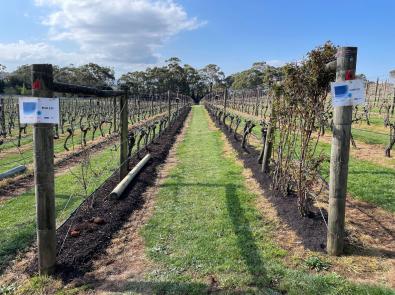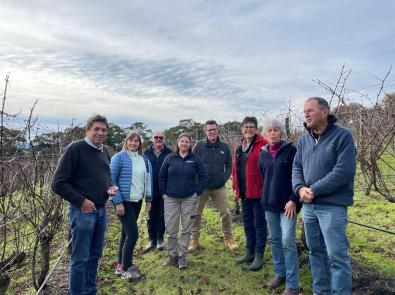
Vineyards turn green into gold: Suburban green waste improves yield and helps wine grapes thrive, trial shows
A recent Melbourne Water trial at Macedon Ranges vineyards has shown that composted recycled green waste collected from suburban green bins can create healthier vines and higher grape yields when used as mulch.
Evaluation of the three-year trial, funded by Sustainability Victoria and delivered by Melbourne Water, has shown recycled organic green waste mulch applied under vines during spring leads to soil temperatures that are just right – moister soil, and fewer weeds. This ‘Goldilocks zone’ refers to the optimal range of soil temperatures for vine growth and grape production.
“The result is higher yields and reduced need for chemicals compared to conventional practices such as brush cutting, herbicides, or application of other mulch types such as straw,” said Karen Thomas, Sustainable Agriculture Facilitator, Melbourne Water.

“This is great news for the wine industry, and the environment. We hope it will encourage other vineyards to look at using high-quality composted green waste made to vineyard specifications.”
The results from the project include a cost-benefit analysis, which shows increased grape yields can offset the cost of purchasing composted green waste if the green waste mulch has high nitrogen content.
Melbourne Water has launched a digital mulch calculator for vignerons who want to calculate how much mulch is needed for under vine area and how much it will cost.
Ms Thomas says the trial demonstrates Melbourne Water’s role as a Catchment Management Authority, which sees it responsible for delivering agricultural projects that benefit food production, improve biodiversity and champion land stewardship.
“We're working with farmers to expand climate-smart, sustainable agricultural practices aimed at boosting food production, caring for land and protecting biodiversity,” said Ms Thomas.
Soil temperature measurements showed the composted green waste mulch created cooler soil in summer and warmer in spring, meaning roots have a longer time in the ‘Goldilocks’ soil temperature zone vital for healthy vines.

Hesket Estate is one of two Macedon Ranges vineyards that participated in the trial. Operating at high altitudes, Hesket Estate is among the coldest vineyards in mainland Australia.
“These conditions allow for the production of outstanding cool climate wines, but also means vineyards in the region are susceptible to extreme weather,” said Ms Thomas.
“These highly labour-intensive vineyards need a reliable method to increase the time vine roots and grapes can spend at beneficial temperatures, and this trial shows that composted green waste mulch is a cost-effective solution,” she said.
Hesket Estate grape grower Elizabeth Hudspeth said of the trial, “It has been very interesting to see how composted green waste mulch can improve soil water retention, increase nutrients, and reduce weeds.”
This project is delivered by Melbourne Water in partnership with Macedon Ranges Vignerons Association, Bio Gro and GrapeLinks, and is funded through the Sustainability Victoria Circular Economy Markets Fund - Organics on behalf of the Victorian Government.
<Ends>
Media contact:
03 9679 7004
|
|
|
|
|
|
|
|
|
|
|